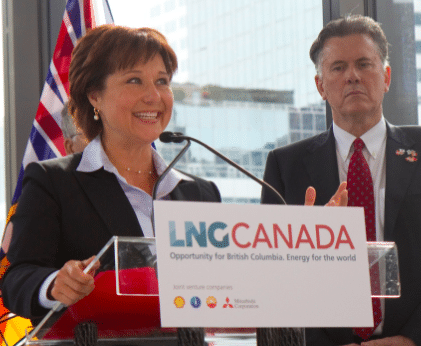The B.C. government’s claim that LNG exports offer the “greatest single step British Columbia can take to fight climate change” is inaccurate in the absence of stronger global climate policies according to a new report released today by the Pembina Institute and the Pacific Institute for Climate Solutions.
Natural gas does have a role to play in a world that avoids two degrees Celsius in global warming, but only if strong emissions reduction policies are put in place in the jurisdictions that produce and consume the gas, says the report, LNG and Climate Change: The Global Context authored by Matt Horne and Josha MacNab.
“Natural gas is often described as a bridge fuel. The question is, how long should that bridge be?” says MacNab, B.C. regional director for the Pembina Institute, a national non-profit focused on transitioning Canada to a clean energy future.
“Our research suggests it must be very short if we’re going to be able to get off the bridge in time to avoid the worst impacts of climate change.”
If strong climate policies were put in place to avoid reaching more than two degrees of warming, the burning of natural gas would peak by 2030 and drop below current levels by mid century, according to the report.
Under that scenario, energy efficiency, renewables and nuclear would increase significantly while the use of fossil fuels drops.
“It’s climate policy that will determine coal use, not the availability of natural gas,” MacNab says. “It’s not simply a question of LNG and coal swapping out for each other.”
The B.C. government’s claim, which was made during the February 2014 throne speech, is premised on two assumptions.
The first is that natural gas is cleaner than coal. On that point, MacNab said that in most cases natural gas is 10 to 40 per cent cleaner than coal assuming that methane is safely managed. However, the Pembina Institute report also notes that there “remains material uncertainty” about the life cycle emissions of natural gas that requires additional research.
The second assumption the B.C. government makes is that LNG will replace coal.
“In a world with weak climate policy, natural gas will not reduce coal use,” says Horne, B.C. associate regional director for the Pembina Institute. “Without a global push for low carbon energy sources and efficiency, LNG will likely worsen rather than ease global warming.”
The institute’s findings are in line with a report published last week in Nature, which found that cheap abundant natural gas will actually delay any efforts to reduce carbon emissions.
B.C. Needs to Put Emissions Reduction Policies Before LNG Strategy
To draw its conclusions, the Pembina Institute report compares the role of natural gas under two different scenarios: one in which global warming is limited to two degrees Celsius and one that stays on the business as usual path. The comparison yields two very different roles for natural gas — either as part of an energy mix that helps avoid dangerous climate change or as part of an energy mix that accelerates the world down the path to dangerous climate change.
“Instead of leading with LNG and natural gas strategies, jurisdictions — B.C. included — need to lead with emissions reduction policies,” the report says.
To avoid more than two degrees of warming and keep atmospheric concentrations of greenhouse gases below 450 parts per million, the International Energy Agency says policies need to include economy-wide carbon pricing, the phase out of fossil fuel subsidies, emissions standards on power plants and a renewable transportation fuel standard.
The Pembina Institute makes three recommendations to the B.C. government to increase the chances that B.C.’s LNG industry can be part of the solution, rather than part of the problem, including applying an evidence-based approach in assessing energy exports, strengthening domestic efforts to reduce emissions from natural gas and LNG development and playing a more proactive role on climate change and methane management globally.
If strong climate change policy was enacted on a global level, natural gas use would peak by 2030 — just 15 years from now. What does that mean in terms of B.C.’s plans to build an LNG industry?
“We would encourage the B.C. government to be thinking about that in terms of the long-term sustainability of the industry,” MacNab says. “B.C. ought to be careful in hitching its economic wagon to a resource that will decline in a carbon-constrained world.”
Photo: Christy Clark at LNG Canada announcement via Province of British Columbia on Flickr
Subscribe to our newsletter
Stay up to date with DeSmog news and alerts






